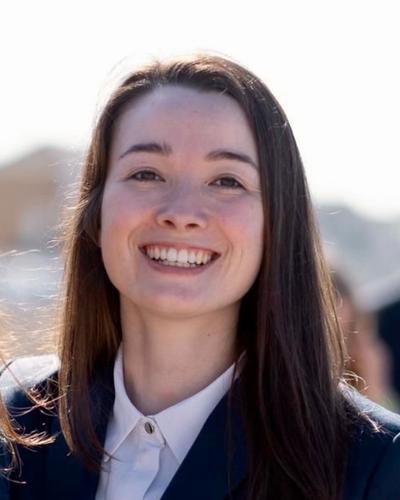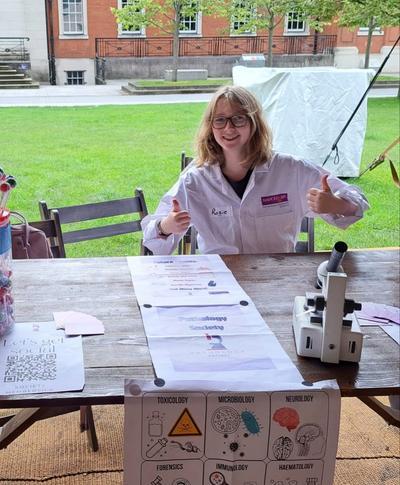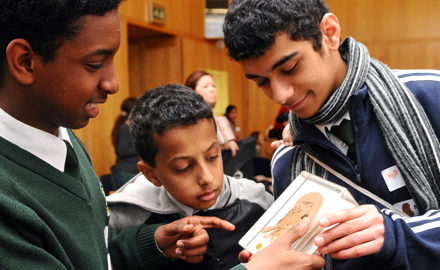RCPath Science Communication Prize
What is the Science Communication Prize?
The Royal College of Pathologists Science Communication Prize is kindly sponsored by Sonic Healthcare UK. It is an award given to a pathology trainee, foundation doctor or undergraduate who has shown excellence in their science communication activities throughout the year. The prizes aim to:
- cultivate awareness among pathology trainees, foundation doctors and undergraduates about the importance of public engagement
- reward and recognise trainees, foundation doctors and undergraduates who have undertaken sustained high-quality science communication activities.
There are 2 prizes, one for each of the following categories:
- Trainee category - UK pathology trainees
- Undergraduate category - UK undergraduates and foundation doctors.
Each winner in the trainee and undergraduate category will receive £500 and be invited to accept a certificate at the College's New Fellows Ceremony, which will be awarded by representatives of Sonic Healthcare UK. An interview with the winner will be posted on the College website.
Judging process
The decision on the Science Communication Prize winner will be made by a selection committee composed of the Vice President for Communications, Director of Publishing and Engagement and a member of the Public Engagement department. Selection by the committee will be based on evidence of a sustained commitment to high quality public engagement activities – further information is in the guidance for applicants below.
How to enter
Full details are in the guidance document below. Completed application forms must be submitted to [email protected] by 23:59 on Monday 28 July 2025.
-
All applications must be made using the official form.
-
Submission of an application provides consent to informal inquiries about the accuracy of any claims made in the nomination.
-
Please keep the application form to a maximum of 2 sides of A4 paper (minimum 11pt text).
-
Forms that exceed this limit may be discarded.
-
An application is valid for that year's award only. Unsuccessful candidates are welcome to reapply in future years.
About our sponsor: Sonic Healthcare UK

The Science Communication Prize's sponsor, Sonic Healthcare UK, are leaders in consultant-led diagnostics, innovation, value, and long-term investment in private and NHS healthcare provision.
Sonic Healthcare UK includes The Doctors Laboratory (TDL) and Health Services Laboratories (HSL) which is a joint venture with UCLH and the Royal Free Hospitals Group. The Doctors Laboratory has over 30 years’ experience in the UK pathology market and have been working in partnership with the NHS for over 20 years.
Sonic Healthcare UK is part of the Sonic Healthcare group, one of the world’s largest clinical diagnostics groups with a demonstrated track record of medical excellence. Find out more at www.sonichealthcare.co.uk.
2024 prize winners
Our 2024 winners are Dr Caroline Cartlidge and Rosalind Walsh. Thanks to the generous sponsorship of this competition by Sonic Healthcare UK, both winners will be awarded £500 each.
Dr Caroline Cartlidge

Dr Caroline Cartlidge is a ST2 histopathology trainee based in Leeds.
Caroline has organised and led various pathology and scientific public engagement events catering for all ages. She collaborated with Thackray Medical Museum, including working with an artist and museum curators to create the exhibition, ‘Behind the Microscope’, demystifying the often-unseen work of pathologists from laboratory bench to bedside.
Caroline has also led both eye and heart dissections with the Thackray Museum team, providing direct interaction with the public and breaking down barriers between pathologists and the community. She also established a partnership with a local inner-city 6th form college to offer high-achieving young people from working-class backgrounds the opportunity to attend a pathology programme she designed (involving teams from the University of Leeds). The programme aims to help level the playing field by offering insights into medicine and pathology, enhancing professional skills, and building networks.
Caroline also engaged with members of the public about bowel cancer screening and used 3D bowel models to offer accessible explanations at the 'Be Curious' public event, which was attended by 1700 people of all ages.
Q&A with Caroline
- How do you feel about winning this year’s RCPath Science Communication Prize?
I am absolutely thrilled to have been selected as the trainee winner of the 2024 RCPath Science Communication Prize! I’m incredibly grateful to the friends, colleagues and collaborators who have supported me along the way and helped make these events a success. It feels an honour to receive this recognition – thank you very much to the judges! Winning this award has given me an even greater boost to continue trying to make a positive impact through public engagement activities. - Why did you enter this year's competition?
I entered the competition after some encouragement from friends and colleagues– and I’m very glad I did! It has been highly rewarding to be part of organising fun, creative and educational events that connect with people of all ages. I hope to inspire curiosity about pathology and research whilst offering opportunities and encouragement to talented hardworking young people from all backgrounds to consider a future career in pathology. - What would you say to anyone who is considering entering this competition? Go for it! This award is a fantastic opportunity to shine a spotlight on the importance of varied public engagement activities in pathology and may help inspire others to get involved and make a difference too.
Rosalind Walsh

Rosalind Walsh is a 4th year medical student at the University of Manchester.
Rosalind (known as Rosie for short) established a new Pathology Society at the University of Manchester in 2022, which she now chairs. The society has a following of over 300 students across multiple disciplines and an engaged and enthusiastic committee. Rosie is also the Student Representative for the Manchester Medical Society Pathology section. In these roles, Rosie has formed successful collaborations with leading professionals, professional bodies and societies to increase engagement about pathology and careers in pathology. She is also co-host of the Royal College of Pathologists' Pathology Careers Webinars and actively promotes these events on the Manchester Pathology Society's social media channels.
Rosalind's passion for pathology began at Primary school and at secondary school she supported her science department with their open days, demonstrating dissections and chatting with visitors. Rosie contacted Professor Mike Osborn when he was President of the Royal College of Pathologists in 2023 and he invited her to attend her first autopsy.
Q&A with Rosalind
- How do you feel about winning this year’s RCPath Science Communication Prize?
I feel very excited and honoured to have won this year's Undergraduate Award. I also feel very grateful to previous and current Manchester Pathology Society committee members for all their hard work to organise Society events and publicity over the last two years. - Why did you enter this year's competition?
I learned about this competition on your website. After reading about the achievements of previous winners, I thought my work founding and developing Manchester Pathology Society and sitting on multiple pathology committees correlated nicely with the criteria for this competition. Winning this prize will support my continued efforts to develop awareness of Pathology careers at a local and national level. Prize winning publicity will also help to establish the credibility of our relatively young Society. - What would you say to anyone who is considering entering this competition? I would say “Apply!”. Even if your pathology events/communications are local or you feel they’re low impact, many combined communications can have a significant impact – the media-multiplier effect!


